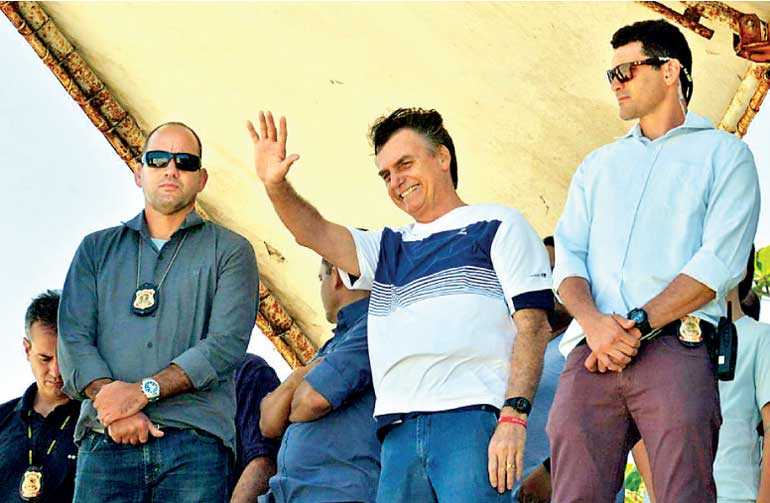Wednesday Feb 25, 2026
Wednesday Feb 25, 2026
Tuesday, 6 November 2018 00:00 - - {{hitsCtrl.values.hits}}

Brazil's new president-elect, Jair Bolsonaro, waves to supporters as he watches airplanes performing near his condominium at Barra da Tijuca neighbourhood in Rio de Janeiro, Brazil - REUTERS
BRASILIA/SAO PAULO (Reuters): For Brazil’s right-wing President-elect Jair Bolsonaro, attacking critical press outlets almost daily on social media is not enough. Once in office, he vows to hit their bottom line.
With half a billion dollars in public-sector marketing budgets coming under his discretion, the fiery former Army captain is threatening to slash ad buys with adversarial media groups, striking at the financial foundations of Brazil’s free press.
After a campaign in which Bolsonaro dismissed investigative reporting as “fake news” invented by a corrupt establishment and his supporters went after individual journalists, the threats are sending a chill through the country’s newsrooms.
Asked in a TV interview last week if he would respect press freedom even for his favorite foil, newspaper Folha de S.Paulo, Brazil’s largest circulation daily, Bolsonaro’s answer was curt.
“That newspaper is done,” Bolsonaro said in a tense TV Globo interview. “As far as I’m concerned with government advertising — press that acts like that, lying shamelessly, won’t have any support from the federal government.”
While public funds are just a fraction of revenue at most major media groups, the prospect of a president out to punish unfriendly coverage has put many reporters on edge.
Several seasoned journalists working for Brazil’s biggest news organizations told Reuters in recent weeks they have started to throttle back their criticism, fearing backlash from a Bolsonaro government — and violence from his supporters.
Brazilian press watchdogs said there has been an escalation of threats and aggression against reporters. Investigative journalism group Abraji began tracking the incidents in Brazil’s most polarized election since the return to democratic government in 1985 after two decades of military dictatorship.
Most of the attacks on journalists were by Bolsonaro supporters, according to Abraji, which recorded more than 150 cases of campaign reporters coming under threat. Roughly half involved physical violence and the rest were online hate campaigns.
“Treating the press as an antagonist is not a new tactic, but the aggressive tone and frequency of Bolsonaro’s attacks are very worrying,” said the group’s coordinator, Marina Atoji.
Bolsonaro’s supporters said the Brazilian media has a leftist bias and they have turned to social media for news about him.
“The worst thing was they tried to crucify Bolsonaro for his controversial statements on women, gays and blacks,” said Emilio Kerber, an Air Force major who ran for Congress in Bolsonaro’s small coalition. “But Bolsonaro has millions of followers on social media and he won anyway.”
Press aides for Bolsonaro did not respond to a request for comment. The president-elect has disavowed any supporters who resort to violence. He said he respects freedom of the press and only asks that it be exercised responsibly.